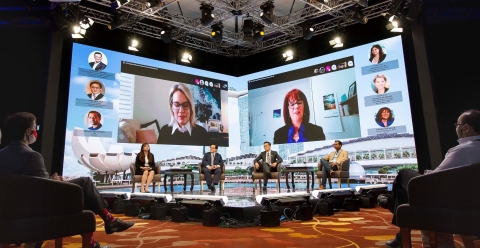STB, PCMA and UFI Release White Paper Reimagining the Future of Business Events

As the meetings, conventions and exhibitions industry dusts itself off and emerges from the pandemic, the need to continue envisioning innovative ways of doing business has never been greater. To help event organizers rethink their offerings and operations, the Singapore Tourism Board (STB), Professional Convention Management Association (PCMA) and UFI, the Global Association of the Exhibition Industry, teamed up to launch a white paper titled “Reimagining Business Events—Through COVID-19 and Beyond.”
“The pandemic has emphasized the need to innovate and be nimble in the business events sector,” said STB Chief Executive Keith Tan. “This journey of transformation is not a sprint, but a marathon that extends beyond the pandemic.”
Launched at the Singapore MICE Forum x IBTM Wired 2021 at Marina Bay Sands, which was the first hybrid version of the event, the white paper highlights key pillars and case studies to support industry transformation and points to signs of strong recovery in the Asia-Pacific and a greater appetite for digital and hybrid events.
The three pillars include Business Models, Delegate Experience and Talent and Capabilities.
For each pillar, STB, PCMA and UFI obtained perspectives from international industry practitioners who embraced and exemplified a growth mindset and piloted innovative and successful concepts during the pandemic. The insights resulted in case studies from Singapore, Australia, Italy and the U.S. Here are some of the case study examples under each pillar:
Business Models: Singapore-based technology company GEVME applied lessons learned from an early prototype to successfully launch a new networking experience. Unexpected Atlanta kept true to its mission of sharing the history and cuisine of the American South and uncovered new revenue streams as its tours went virtual.
Delegate Experience: Singapore’s Emerging Stronger Task Force convened an Alliance for Action that tested new ideas for business events and swiftly applied lessons to fine-tune solutions for subsequent pilots. The Italian Society of Anaesthesia, Analgesia, Resuscitation and Intensive Care partnered with AIM Group International to design a traveling roadshow and a digital program to reach its association members amidst heightened restrictions across Italy.
Talent and Capabilities: The Singapore Association of Convention and Exhibition Organizers and Suppliers co-created programs and career roadmaps to help business event professionals acquire skills required even post-pandemic. The Melbourne Convention and Exhibition Centre organized a hackathon, in which staff and external industry partners came up with promising concepts for new revenue streams.
“The pandemic forced us to look at how we deliver on what our audiences need and what they want to be successful for the future,” said PCMA President and CEO Sherrif Karamat. “Our success in emerging from the pandemic is dependent on our ability to solve the transformational challenges of our audiences.”
Meanwhile, the white paper highlights strong indications of growth and innovation in the Asia-Pacific as the industry recovers from COVID-19.
Data from the upcoming “Global Recovery Insights Report” by UFI, Explori and Society of Independent Show Organizers (SISO) shows that exhibitions in Asia are likely to see stronger participation growth from both visitors and exhibitors, compared to the rest of the world.
There is also a stronger demand for digital or hybrid events from respondents in Asia, who said they are more than twice as likely to have participated in such events than respondents from other regions. Furthermore, the number of events they are planning to exhibit at has recovered to pre-pandemic levels, when compared with pre-pandemic research data from 2019.
PCMA’s APAC Dashboard Survey reflects similar findings. A greater proportion of planners in Asia Pacific (38 percent) were planning to simultaneously stream their in-person events to virtual audiences, compared to their North American counterparts (17 percent). Of the APAC respondents planning a hybrid 2021 event, nearly 80 percent planned for their in-person and virtual audiences to interact, compared with 27 percent of North American planners
Don’t miss any event-related news: Sign up for our weekly e-newsletter HERE and engage with us on Twitter, Facebook, LinkedIn and Instagram!


Add new comment